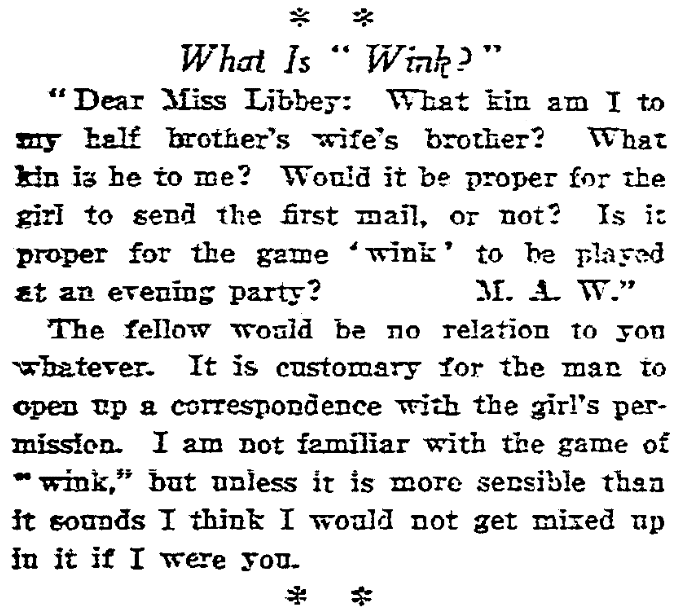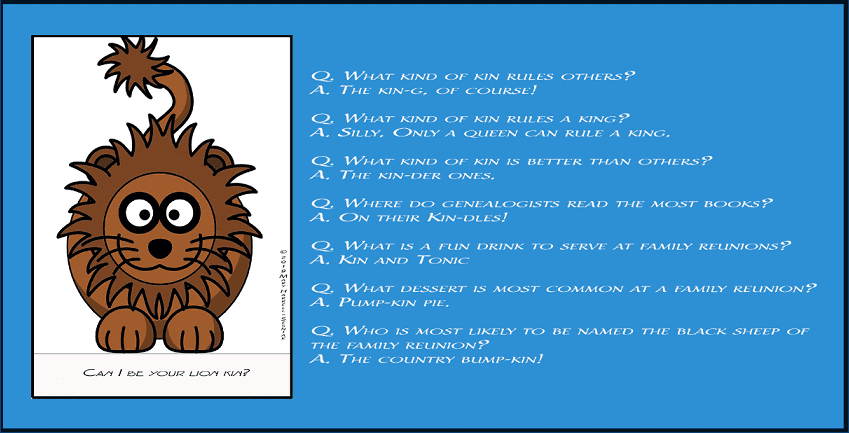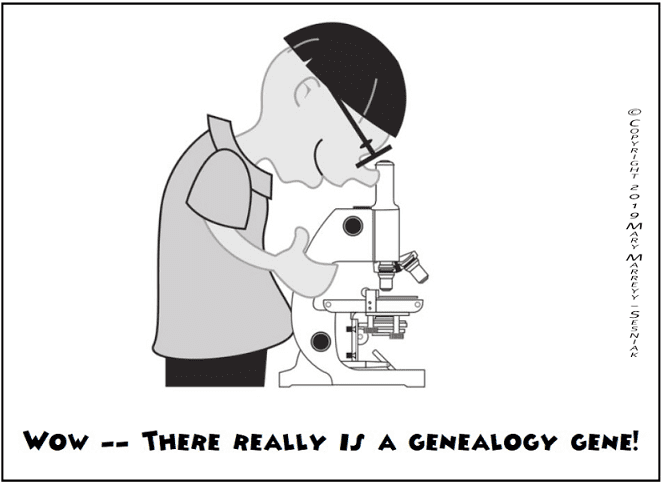Introduction: In this article, Mary Harrell-Sesniak looks through old newspapers to find jokes our ancestors told about kin. Mary is a genealogist, author and editor with a strong technology background.
Judging from how many kin jokes I find in old newspapers, such as GenealogyBank’s Historical Newspaper Archives, I am quite certain my forebears were humorists in kin-dred spirit.
Kin Jokes
I mean, who else sat around and came up with jokes like these? I’ve actually got a lot more that will show up in later posts.
(Is the text in this graphic too small for you to read? If so, use your browser’s zoom feature to enlarge it. Or, for your convenience, I’ve reprinted these kin jokes at the end of this article.)
And not only that, if DNA-testing scientists can determine the likelihood that someone has straight or curly hair, or whether or not someone prefers chocolate over vanilla, it’s only a matter of time before they prove that family historians really did inherit a genealogy gene!
So, in that “spirit” I present a few kin jokes to brighten your day.
- Q: What kin is that child to its own father, who is not its father’s own son? (1844)
- A: A daughter!
From 1888, I found these two jokes which appeared over and over in later years.
- Q: What kin is the door mat to the door?
- A: A step father (step further).
- Q: What sticketh closer than a brother?
- A: A postage stamp, by gum.
Facetious Statements
Sometimes I found one-liners in the old newspapers:
- If you can’t be ideal in any other way, be an ideal poor kin. (1910)
- Almost all rich people imagine they would enjoy helping their poor kin – if they haven’t any. (1913)
Kin Query
While researching kin jokes, I came across a query that inspired this blog article. It came from a cute question in 1909 to society columnist Miss Libbey of the San Francisco Chronicle.
- Q: Dear Miss Libbey: What kin am I to my half-brother’s wife’s brother? What kin is he to me? Would it be proper for the girl to send the first mail, or not? Is it proper for the game “wink” to be played at an evening party? M. A. W.
- A: The fellow would be no relation to you whatever.
On that note, I’m as confused as Miss Libbey is about the game of wink, but it certainly teases the imagination, doesn’t it!

Unfortunately, the query was only signed by initials, but that is a reminder for all family historians with kin in California or nearby to check if they had an unmarried ancestor with the initials M. A. W. who might have submitted it!
Kin Jokes from the Graphic Above
- Q: What kind of kin rules others?
- A: The king-g, of course!
- Q: What kind of kin rules a king?
- A: Silly, only a queen can rule a king.
- Q: What kind of kin is better than others?
- A: The kin-der ones.
- Q: Where do genealogists read the most books?
- A: On their kin-dles!
- Q: What is a fun drink to serve at family reunions?
- A: Kin and tonic.
- Q: What dessert is most common at a family reunion?
- A: Pump-kin pie.
- Q: Who is most likely to be named the black sheep of the family reunion?
- A: The country bump-kin!
Related Articles:



There are also some cute entries in the U.S. Federal Census, like that for the 1870 census of Ellsworth KS, for George and Elizabeth Palmer and the residents of their “house”!
Larry,
Thank you for this suggestion.
Mary
Winkum, as our youth group calls it, was a game played at retreats or get togethers. The strategy is similar to duck duck goose. The group sits on chairs in a circle. One person is chosen to be “it” and moves to the center of the circle. This leaves one unoccupied chair. “It” chooses someone by winking at them. Might be someone of the opposite sex. They then race to the unoccupied chair. The one left without a chair is the new “it.” The game can get quite rambunctious as tee shirts are grabbed to hinder the other from getting to the empty chair. Some kids had special winkum shirts to keep their other clothing in one piece.
Kathy,
Sounds like a fun game. Thank you for sharing.
Mary
Thanks for the information.
You’re very welcome Paula!
Our version of “wink” or “winkum” was slightly different. We sat in a double circle with one empty chair in the inner circle. The person behind the empty chair would wink at someone in the inner circle. That person would try to get up before a partner in the outer circle could put a hand on the winkee’s shoulder. (One of our high school-age youth games back in the 1950s.)
Ken,
Sounds like a fun game. Thank you for sharing your version.
Mary